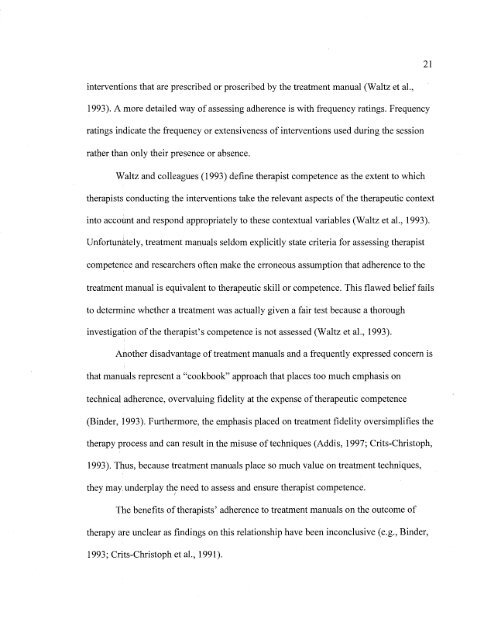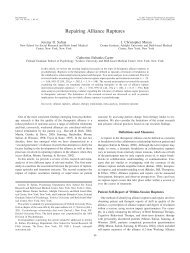Download - The Safran Lab
Download - The Safran Lab
Download - The Safran Lab
You also want an ePaper? Increase the reach of your titles
YUMPU automatically turns print PDFs into web optimized ePapers that Google loves.
interventions that are prescribed or proscribed by the treatment manual (Waltz et al.,<br />
1993). A more detailed way of assessing adherence is with frequency ratings. Frequency<br />
ratings indicate the frequency or extensiveness of interventions used during the session<br />
rather than only their presence or absence.<br />
Waltz and colleagues (1993) define therapist competence as the extent to which<br />
therapists conducting the interventions take the relevant aspects of the therapeutic context<br />
into account and respond appropriately to these contextual variables (Waltz et al., 1993).<br />
Unfortunately, treatment manuals seldom explicitly state criteria for assessing therapist<br />
competence and researchers often make the erroneous assumption that adherence to the<br />
treatment manual is equivalent to therapeutic skill or competence. This flawed belief fails<br />
to determine whether a treatment was actually given a fair test because a thorough<br />
investigation of the therapist's competence is not assessed (Waltz et al., 1993).<br />
Another disadvantage of treatment manuals and a frequently expressed concern is<br />
that manuals represent a "cookbook" approach that places too much emphasis on<br />
technical adherence, overvaluing fidelity at the expense of therapeutic competence<br />
(Binder, 1993). Furthermore, the emphasis placed on treatment fidelity oversimplifies the<br />
therapy process and can result in the misuse of techniques (Addis, 1997; Crits-Christoph,<br />
1993). Thus, because treatment manuals place so much value on treatment techniques,<br />
they may underplay the need to assess and ensure therapist competence.<br />
<strong>The</strong> benefits of therapists' adherence to treatment manuals on the outcome of<br />
therapy are unclear as findings on this relationship have been inconclusive (e.g., Binder,<br />
1993; Crits-Christoph et al, 1991).<br />
21



